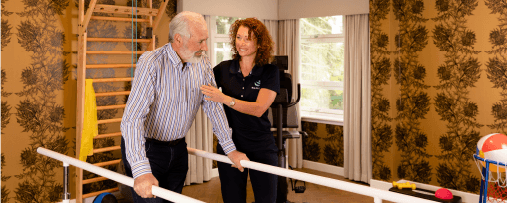
Exercise a great way to get back on your feet
08 July 2021

Judith Paterson, co-director at Balanced Edinburgh and lead physiotherapist at Cramond Residence, looks at why exercise is so important for those of advancing years.
As our work with the wonderful residents at Cramond Residence shows, staying active as you get older promotes independence, allowing you to continue doing the things you enjoy such as playing with grandchildren, walking with friends and going on holiday. Activity also helps to reduce aches and pains, increases energy levels, promotes a good night’s sleep and improves overall wellbeing.
This isn’t the end of the benefits that exercise can bring: Physical activity has proven benefits for cognitive and brain health in older adults. Observational studies provide consistent evidence that the age-associated cognitive decline and the neurodegeneration observed in Alzheimer Disease and Parkinson’s disease may be slowed or delayed in physically active adults.
It is a myth that people living with conditions such as Dementia can’t take part in exercise or that they get nothing from it. Indeed, our experience at Cramond Residence, shows that people living with Dementia seem to really benefit from exercises that feature patterns of movement and which are done to music.
The flip side to this particular coin is that a lack of exercise can cause real problems. Unfortunately, on average the over 65s spend 10 hours a day being sedentary and the price for that inactivity is increased chance of falls, obesity, heart disease and even early death.
What should you do?
The good news is that exercise is something anyone can do something about. You don’t have to even leave your home, although if you can get out into your local park or down to your local Church Hall, so much the better.
Any exercise is good, but at Balanced we advise doing a little bit of something most days, rather than tiring yourself out all in one go. We recommend carrying out 10-20 minutes (depending on your ability) of targeted exercise most days alongside general aerobic activity. To move forward and improve, the trick is to try and do a little bit more each week and to work up to doing around 3 hours of moderate level exercise each week, ideally spread over 7 days. This exercise must be enough to increase your heart rate.
What exercises should I do?
As in the exercise programmes we run at Cramond Residence, any home exercise regime should be a combination of physical activity and targeted exercise with a focus on strength, flexibility and endurance. One example of the type of exercises that can be done in your front room is ‘sit and stand’. The ability to rise from a chair is critical in terms of independence so this is a highly functional exercise that is also aerobic, stimulates balance and builds strength in the leg muscles.
This and five other great exercises can be found at: http://www.capa.scot/wp-content/uploads/2020/05/25balancechallengeSuper6pdf.pdf. These exercises are recommended by the NHS, Chartered Society of Physiotherapists and all age concern groups. The exercises have been proven to reduce the chance of falling when performed regularly.
In addition to targeted exercises like these we also recommend that people increase their physical activity with other forms of movement such as walking in the park and gardening, or through sports such as badminton or exercises such as Tai Chi.
Is it ever too late to start exercising?
At Balanced we see the biggest improvements in those who are starting from scratch and they are usually the ones who presume they won’t be able to get better. For example recently an 83-year-old man with a very arthritic hip managed to improve both his balance and his ability to rise from a chair in just three weeks. Initially he could only perform eight repetitions of the sit-to-stand exercise in 30 seconds, but three weeks later he was able to perform 12. Basically it is never too late to start exercising!
Where can I go to get help?
If you have friends and family nearby rope them into help and do your exercises together. Beyond that, Edinburgh Leisure is a really good resource for anyone looking for exercise opportunities and classes. They offer a wide range of classes for older people across the city – everything from seated exercise classes to badminton lessons. Church halls and other community spaces are other places to go and look for classes.
At Balance, we run a wide range of classes and physiotherapy treatments. To get people started on the best possible course we also do what we call a ‘functional fitness MOT’. This uses an assessment tool developed by Glasgow Caledonian Uni to assess the functional ability of the older adult. It allows us to plot results on a graph and allows our clients to compare their capabilities with others in their age group – which helps kindle a bit of healthy competition. It’s highly motivating and allows our therapist to provide a tailored and effective exercise programme. So, if you’re thinking of getting physical – whatever your age – why not give us a call first, so that you can be certain your setting off on the right foot.
To contact Balanced Edinburgh, call: 0131 315 3105 or visit www.balancededinburgh.co.uk

